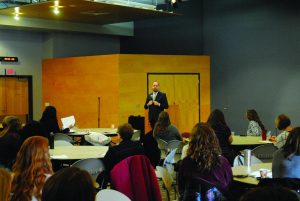UW Oshkosh administrators address budget woes
February 19, 2020
UW Oshkosh has asked the UW System for financial help as part of a plan to manage its budget that aims to cut spending and invest in enrollment.
The university has a “budget hole” due to a projected decline in enrollment over the coming years, Chancellor Andrew Leavitt said at the first Coffee with the Chancellor forum of the semester on Monday.
Leavitt and his fellow administrators used the open forum to address campus concerns surrounding the budget and declining enrollment.
“We don’t have a spending problem; we have a revenue problem,” Leavitt said.
He said enrollment is expected to continue declining because of fewer young people pursuing higher education than in past generations and falling birthrates.
The UW System tuition freeze is making matters worse, as the university can’t raise tuition to combat declining enrollment and a lack of state funding, he added.
“A 2% increase in tuition for us would be huge; it would really help us financially,” Leavitt said.

Chancellor Leavitt hosted an open-forum to address campus concerns Monday.
To address the budget hole, the university is offering retirement incentives to 300 employees, offering qualifying employees 50% of their base salary as an incentive to retire, according to a Dec. 9, 2019 email to employees.
So far, Leavitt said 125 employees have expressed interest, but it’s unclear how many will pursue retirement.
This is the third time UWO has offered retirement benefits to employees in an attempt to reduce spending, he said.
The university saved $3 million the first time it offered retirement incentives and half a million dollars the second time, Leavitt added.
“It is, I think, the most humane way of reducing the [full-time] faculty and staff, because that’s always our No. 1 expense,” he said.
The voluntary retirement incentives are the first part of a four-pronged plan that aims to reduce the budget hole, Provost and Vice Chancellor for Academic Affairs John Koker said.
For the second part, Koker said the university asked the colleges to submit budget templates with 3% and 2% reductions.
He said the amount of the reductions isn’t set in stone and depends on how much can be saved from the retirement program.
Thirdly, UWO is looking to increase investment in enrollment, he said.
The fourth part is a request to the UW System for financial assistance between $2 million and $3 million, Koker said.
The request was filed last Friday and will be used to help the university until its enrollment investments pan out, he added.
“Every one of those parts is going to depend on how the other parts play out,” Koker said of the plan.
Vice Chancellor for Student Affairs Cheryl Green shared the latest enrollment projections from the admissions office.
Net admissions on the UWO-Fox Cities campus are up 11.1%, and diversity admissions are up 63%. At UWO-Fond du Lac, net admissions are up 71.9%, while diversity admissions are up 60%.
“We are making some huge impacts on our access campuses and that was a real area of concern for us as we finalize the last phase of restructuring,” Green said.
At UWO, she said total admissions are down 5.4% from last year, while diversity admissions are down 8.2% from last year.
To address the problem, UWO offered free applications from Jan. 27 to Feb. 2. Green said the free application week garnered an additional 1,071 applications.
She added that the free week gives UWO a chance to tell potential students about the university.
“It gives us an opportunity to invite them to campus for preview days and cultivate that relationship so that they do end up registering here,” Green said.
The UW System restructuring has hurt the university’s transfer admission numbers because students coming to UWO from the access campuses are no longer counted as transfer students, she added.
Prior to restructuring, she said UWO was the No. 1 transfer school among four-year UW universities.
“The comprehensives have their own access campuses too and it’s changed the playing field with transfer students,” Green said.
Aside from the free week, Assistant Vice Chancellor for Enrollment Management Aggie Hanni said UWO is paying attention to what its competitors are doing to increase enrollment.
The competition for students between higher education institutions has become the “wild west” in recent years, she said.
“We’re seeing students receiving invitations, even after they have committed to attending [UWO], from other institutions, inviting them to consider going somewhere else,” Hanni said.
The university is also looking to remove barriers that may prevent prospective students from coming to UWO, she said.
“We continue to waive obligation fees for students who communicate to us that they cannot afford it,” Hanni said.
UWO will launch a new online application that the UW System is currently developing on Aug. 1. Leavitt said the current application takes an average of 45 minutes to complete, while applications for other institutions can take 15 minutes to complete.
“I just pray that there is enough robust testing that when they go live on Aug. 1, we don’t have [a repeat of] the Iowa caucus,” Leavitt said.
To increase enrollment, he added that UWO is also targeting nontraditional students by working with employers in the area to try to upskill their workforce.
“Adult learners really represent the largest potential growth for this institution,” Leavitt said. “But we have a long way to go in terms of how we deliver education, because they aren’t available at 10 a.m. Monday, Wednesday, Friday.”













